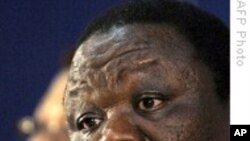Further indicating the depth of the crisis in Zimbabwe's long-shaky power-sharing government, Prime Minister Morgan Tsvangirai disclosed this week that he now has limited contact with President Robert Mugabe after a falling-out over the president's unilateral re-appointment of ZANU-PF governors in the country's 10 provinces.
Mr. Tsvangirai, in Paris this week, told the France 24 television network that he sees Mr. Mugabe in cabinet meetings but their Monday meetings, once held on a regular basis, have ceased because he found them “unhelpful.” He added that President Mugabe had eroded the trust built in the past two years.
Their power-sharing government, tenuously balancing Mr. Mugabe's ZANU-PF, Mr. Tsvangirai's Movement for Democratic Change, and the rival MDC wing of Deputy Prime Minister Arthur Mutambara, launched in February 2009 based on the Global Political Agreement all three men signed in September 2008.
That agreement resolved an extended crisis brought on by disputed elections held in March 2008 culminating in a June presidential run-off election in which Mr. Mugabe was unopposed, Mr. Tsvangirai having pulled out of the race in protest of escalating and often deadly violence mainly directed at members of his opposition party.
The Movement for Democratic Change founder told France 24 that the unity government has made some gains in its 21 months in power, though these have been limited in terms of political reform and social services.
Mr. Tsvangirai said he does not believe that Mr. Mugabe, now 86, wants to die in office, but is being pressed to hang on by those backing him and whose fortunes depend on his remaining at the top.
Political analyst John Makumbe of the University of Zimbabwe told VOA Studio 7 reporter Jonga Kandemiiri that Mr. Tsvangirai’s comments signal that the unity government is becoming increasingly dysfunctional.
Political analyst Khuli Mathulela Sibanda told Ntungamili Nkomo that Prime Minister Tsvangirai’s withdrawal from personal contact with Mr. Mugabe suggests the unity government may be close to collapse.
Tensions have been rising in the past month amid MDC objections to unilateral appointments by Mr. Mugabe and calls for fresh elections next year. The military has been positioning itself in support of Mr. Mugabe.
The forced adjournment of the Senate this week due to MDC protests objecting to the seating of governors named by the president contributed to the sense that the unity government’s days are numbered.
For perspective, reporter Patience Rusere turned to London-based analyst Lloyd Msipa, and Sidney Chisi, director of the Youth Initiative for Democracy in Zimbabwe. Both said recent events reflect an attempt by ZANU-PF to force the MDC out of the inclusive government. Chisi said the power-sharing arrangement is now at risk.
As the Senate and House of Assembly prepared to adjourn, legislators held a constitutional revision outreach process of their own following the completion of a national public comment exercise. But disturbances broke out as MDC legislators took issue with comments from Mashonaland Central ZANU-PF Provincial Chairman Dickson Mafios (ZANU-PF, Mount Darwin North) urging Zimbabweans to seize the land of remaining white farmers.





